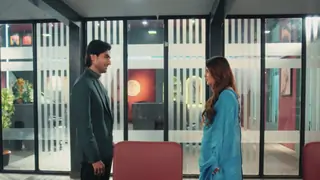In Pakistan and India, rock star Salman Ahmad plays to crowds of hundreds of thousands, filling cricket stadiums with fans obsessed and screaming his name. The goateed, long-haired musician can't walk the streets without being besieged for his autograph. His every move is tracked on blogs maintained by devotees.
The founder of Junoon, South Asia's best-selling rock band, Ahmad, 41, has been called the founder of "Sufi rock," a style that blends the traditional qawwali music of the region's Sufi shrines with guitar riffs that someone the likes of Led Zeppelin or Santana might play. His band has sold more than 25 million albums – a number that places him in the realm of Janet Jackson and Nirvana and makes him no stranger to MTV India's No. 1 spot.
Rocker Salman Ahmad jams at a recent reunion concert for his band Junoon in Dubai, Saudi Arabia. In Urdu, "Junoon" means obsessed. (Courtesy Salman Ahmad)
The glow of fame in New York, however, is a different story, and since Ahmad moved here three years ago, he has found himself playing to a bevy of smaller, more academic audiences. As if to explain, posters outside university lecture halls label him the "Muslim Rock Star." He only sometimes finds his CDs buried in "World Music" bins at record stores. And the multicultural organizations that host his shows often request pre-concert talks so he can tell who he is and what he's about to play.
It's a contrast, but Ahmad was the one who chose it. He moved his family here not only to provide them some breathing space and anonymity, but because his heart told him he needed to come. He's in America, he said, to build bridges after Sept. 11 and to add his Sufi-influenced tolerant outlook to the worldwide discussion on the future of Islam.
"It's been a roller-coaster ride," said Ahmad, reflecting. "But I can better see Pakistan and South Asia from this perspective. And I'm trying to get where more mainstream America can find out what I'm about."
Ahmad's approach to rock 'n' roll has been compared to Bono, and his band's to U2: Their lyrics aren't about women or sex, but about greater matters of peace, health and healing. Banned in Pakistan for several years in the late 1990s because of songs challenging government corruption and the nuclear race with India, Ahmad was later appointed a United Nations Goodwill Ambassador. He has used his most recent releases – about AIDS prevention and reconciliation after India and Pakistan's historic 1947 split – to raise money for victims of last fall's earthquake in Kashmir.
The credit for that social-justice outlook, Ahmad said, goes to Sufism, the mystical tradition within Islam and the dominant form of Islam in South Asia. There, Sufis seek God or spiritual truth directly, through a wide range of beliefs and rituals – such as meditation, music, ecstatic dancing and poetry – and practitioners include not only Muslims but Hindus, Sikhs, Buddhists and most anyone else who wants to join in.
With love as a central theme, Ahmad said, peace and tolerance follow.
"It's like all the time being inside and thinking about the beauty and truth in the universe," he said. "You acquire an ability to see with the heart. Religion, color – they just melt."
A visitor to any of the Sufi shrines that dot India and Pakistan's landscape will hear, on Thursday or Friday evenings, the sounds of traditional Sufi qawwalis – Urdu or Punjabi praise music played on tablas, or hand drums, and harmonium, a hand-pumped organ. Decades ago, singers such as Nusrat Fateh Ali Khan and Abida Parveen made qawwalis commercially famous; Ahmad took them one step further in the merge with rock 'n' roll.
Ahmad's Sufi leanings come not from growing up in a Sufi-following family. With much of his childhood spent in the United States – in Rockland County, N.Y., because his father worked for Pakistan International Airlines – Ahmad was turned on to Sufism only after returning to Pakistan for medical school. After completing his degree and joining a well-known Pakistani pop band called the Vital Signs, he found himself unfulfilled until he met Nusrat at a benefit concert about 15 years ago. Discovering the depth and meaning of Sufi tradition, he spent two years studying with Nusrat, learning to merge qawwalis with his Aerosmith-sounding guitar.
"The Sufi idea came through music and I was stung. Obviously there was something in me waiting to be wounded," Ahmad said. "It kind of blew my mind. I had just associated Sufis with religion. Then I was so blown away by the poetry, by the voice."
Describing himself as musically "born again," Ahmad now uses the words of the Qur'an and Sufi poets Rumi and Bulleh Shah when he writes. While not a member of any particular Sufi order – the mystics are grouped together in certain lineages, almost like monastic orders in the Catholic Church – he describes the composing process in the same spiritual terms Sufis use to describe their zikr, or meditation.
"Once I got into music I had all these questions about where melodies come from, where inspiration comes from, where creativity comes from," he said. "When I write, I get possessed. I get struck. I have no concept of time."
The band Ahmad pulled together in 1990 with Pakistani Ali Azmat and later Brian O'Connell, a boyhood friend from New York, drew its name from that concept – Junoon in Urdu means "obsessed" and its fans are called Junoonis, or "obsessed ones." The group hit its stride in 1995 with a CD called "Inquilaab," or revolution, and a song called "Ehtesaab," or accountability, followed by a music video featuring a horse dining at a fancy hotel – a stab at then-Prime Minister Benazir Bhutto's husband, who owned polo ponies. A few years later the band toured both India and Pakistan with hits from their album "Azad," which means freedom.
Parallel to the group's rapid rise in success was an increase across India in the popularity of Sufi music, a trend both Swaminathan Kalidas, India Today magazine Arts Editor, and Sohail Hashmi, a documentary filmmaker, attribute to Muslim-Hindu violence in Ayodhya in 1992 and Gujarat in 2002. The nation was seeking calm in the midst of religious tumult and Sufi groups like Junoon – singing of harmony and acceptance – spread a message that soothed that need, the Delhi-based critics said.
The popularity of Sufi music continues today, but Junoon does not: The band decided to call it quits after more than a decade and after Ahmad and O'Connell each moved back to New York. Citing too many years together and needs to explore new avenues, Ahmad said one of the main reasons the group broke up was so he could get beyond that fame kept him from doing the work he likes most.
"I felt frustrated with what I was doing with Junoon. I was in this rock 'n' roll circus. People were affected by my celebrity," Ahmad said, so much so he felt he couldn't get out his social-justice message.
Sept. 11 made him realize, more than ever, his role: "For most Muslims it was the lights being turned on, somebody asking the question, 'Are Muslims inherently violent?'" he recalled.
He knew it was up to him to answer the question.
Living again in Rockland County, his boys enrolled in the same middle school he attended and his wife Samina, also trained as a doctor, serving as his manager, Ahmad has been at work on his solo album, "Infiniti," released last year, and two documentaries for the BBC. The first show, "The Rock Star and the Mullahs," tells the story of a tour Ahmad made of northwest Pakistan after increasingly fundamentalist Islamic leaders attempted to ban music in all forms. The second, "It's My Country, Too," features his interviews with Muslim Americans on life in post-Sept. 11 America.
In February, Ahmad performed at the U.S.-Islamic World Forum in Doha, Qatar, and in March, he joined former Junoon members for a reunion concert in Dubai, Saudi Arabia. At the end of April he'll be honored by the Muslim Public Affairs Council for his use of music to promote peace. He's also slated this summer to perform in Central Park.
It's a busy lineup, but the shows Ahmad most looks forward to, he said, are the ones on small university stages where only a few audience members may know his name.
"That's where I find myself in my element," he said. "Doing unplugged storytelling concerts, telling how the Sufi tradition and Sufi music translate into the 21st century."
If a recent performance at Nassau Community College on Long Island is any example, Ahmad is talking about meeting crowds of 20-somethings who live lives far from Pakistan, far from understanding the complexity that is Islam. Students who, if they're paying attention, will meet through music the Sufi outlook Ahmad hopes can open doors between East and West.
Backed by a tablas drummer who beats out rhythms on the floor, Ahmad – clad in stonewashed jeans, a black V-neck shirt, wooden necklace and backward baseball cap – will pluck out qawwali ecstasy on his guitar strings, his knee lifting and head shaking in pure rapture as the audience slowly rises to its feet. Students from the South Asia who already know his music may lead, but soon others will join in unabashed, full-arm, above-head hand-clapping and bangra-influenced fancy footwork. Cell phones will snap pictures, friends will ride friends' shoulders, cries of "Pakistan Zindabad" ("Long live Pakistan") may even be heard.
Ahmad plans to be here for the next 10 years at least – enough time, he hopes, to show that Islam, especially Sufi Islam, has more to offer the world than bloodshed and war.
"The world separates and polarizes, yet Sufism sees everyone as one," he said. "Sufism is for me a long-lost bridge people have to find. It allows me to look at someone else – black, white, green, red, Jewish, Christian, Muslim – and see them as human."























